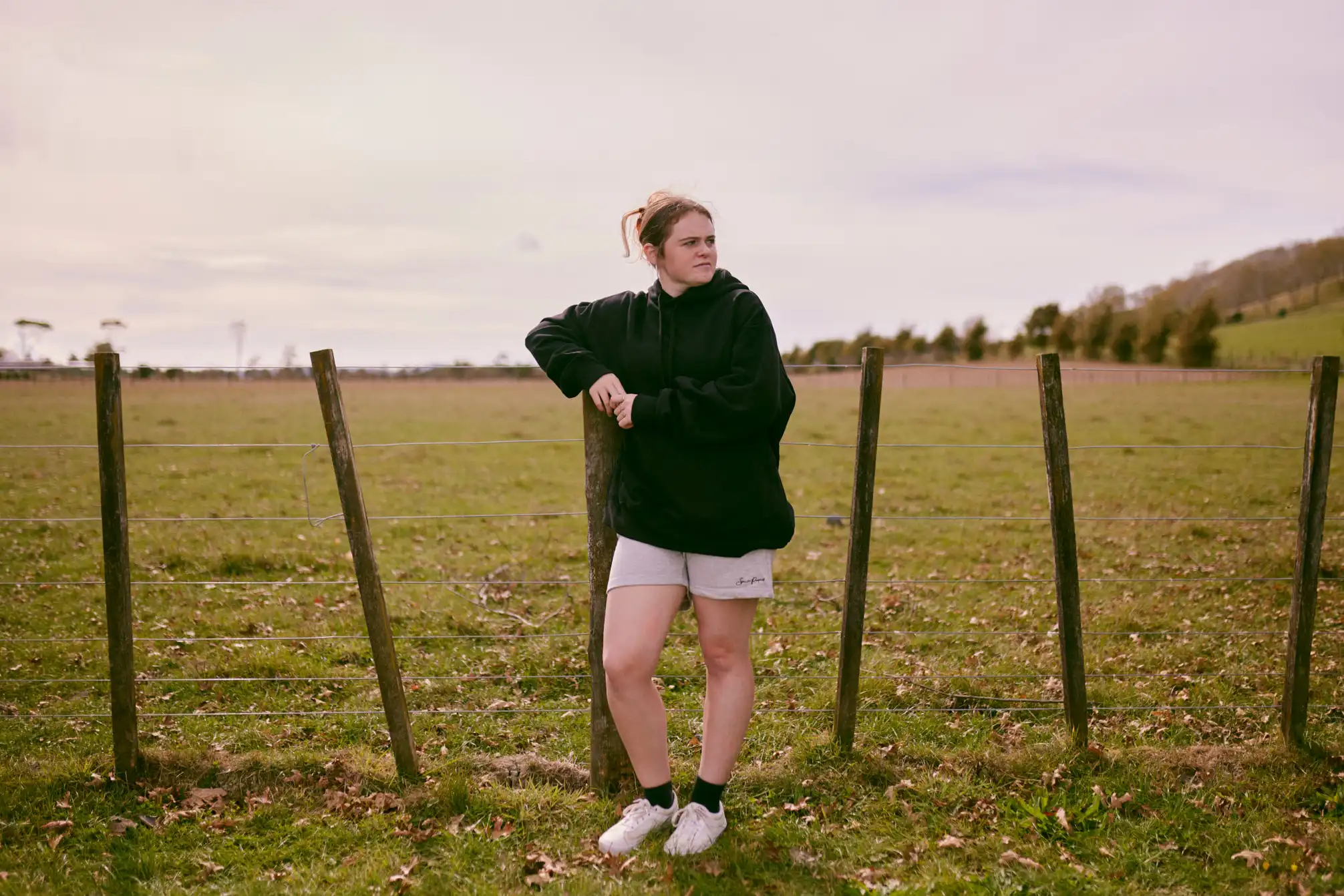Anxiety
Understanding anxiety and how to handle it
Feeling anxious or worried is totally normal, especially when difficult stuff or big changes happen in life. It’s a part of your body’s “warning system.” When we feel worried, our brain is signalling that something might be wrong or dangerous. This then helps us stay alert and ready to respond. But if these feelings get too intense or last too long, they can become overwhelming and stop being helpful. If these feelings are getting in the way of you doing the things you want to or need to do in life, then you might be experiencing anxiety.
People feel anxiety differently, it can feel like being super worried, scared of bad things happening, or wanting to avoid places or situations that trigger these feelings. It can also cause physical symptoms like trouble focusing, fast heartbeat, or feeling sick.
If anxiety feels overwhelming, it’s important to talk to someone. A counsellor from Youthline can help you find people who can support you and ways to handle your feelings better. In this article, we’ll look at signs of anxiety and share tips to help you feel more in control.
Signs and symptoms of anxiety
While we’ve named this section “signs and symptoms of anxiety”, everyone’s experience of these feelings is unique. You might identify with different terms or descriptions. Use the words that connect with you.
Feeling anxious does not mean you have an anxiety disorder. Most people feel nervous when things are uncertain or difficult. But if you’re feeling this way a lot, there are people and strategies that can help you feel better.
Feeling anxious can show up in different ways in your body or in your thoughts and feelings. It’s important to notice these signs so you can get support and find ways to feel better. Signs that other young people have told us about noticing includes the following:
Physical signs | Tinana
Head: Dizziness or feeling faint, difficulty concentrating, difficulty sleeping, easily tired after doing small tasks, restless, grumpy/irritable, tense.
Eyes: Feeling like crying.
Throat: Dry mouth, difficulty breathing, and shortness of breath, feeling of choking.
Chest: Tightness in the chest and shoulders, heart beating fast, chest pain.
Armpits: Sweating, chills, or feeling hot.
Tummy: Sick or pain feeling in the stomach, lump in the stomach, needing to go to the toilet, nausea, cramping. Feeling more or less hungry than usual.
Hands: Shaking, clammy, sweaty.
Tension in your body – you might feel it in your shoulders, neck or jaw.
Thoughts and feelings | Hinengaro
- Thinking something really bad is going to happen.
- Fear of losing control or going crazy, you might feel like your mind is overactive, with rapid thoughts in a constant stream.
- Fear of dying or getting really sick.
- Negative thoughts like “I can’t do this” or thinking badly about yourself.
- Thinking about how you can avoid situations, people and places that make you anxious.
- Feeling numb or disconnected from people, places or activities.
- Feeling empty, lonely or isolated.
- Feeling that you’ve lost your mana.
Different types of anxiety
There are several types of anxiety:
Separation Anxiety
This is worrying about being separated from those who you love more than is appropriate for your age, phase of life and culture. You might worry so much that you can’t leave them in case something awful happens to them or you. Or you might worry that you will become separated from them so much that you feel sick and can’t sleep without them nearby.
Social Anxiety Disorder
This is worrying a lot about being in a social situation where there is the possibility of judgement, embarrassment or rejection by others. This is more than being shy. You may find it difficult when talking with new people, eating and drinking in public, performing, or giving a speech or presentation. You may begin to make changes to your behaviour in significant ways to avoid the worry, to the point it interferes with living your life.
Selective Mutism
Selective mutism is when someone regularly and for a while doesn’t speak in a situation where they are expected to, such as at school or home. Despite being able to speak in other situations, it keeps them from living the life they deserve to access. This isn’t a choice, but a physiological response to worry.
Agoraphobia
This is the fear of at least two of the following things because you feel that you might not be able to escape or get help, and you will have a panicky reaction in public:
• Using public transport, like cars, buses, trains, ferries, planes
• Being in open spaces, like parking lots, marketplaces, or bridges
• Being in a closed space, like shops, theatres, or cinemas
• Standing in a line or being in a crowd
• Being outside of the home alone.
You may actively avoid the situation or do it only with a bestie or safe person or endure it with intense fear/anxiety.
Generalised Anxiety
This is when you are constantly worrying all the time about lots of different things and finding it hard to stop worrying and just chill. You might worry about how you are doing in school or at work, what’s going to happen the next day, “what if” this and that. Your worrying gets in the way of you living your life how you like to live it.
Specific Phobias
Phobias are getting really scared about a specific object or situation. These things bring on feelings of panic every time they are faced, and the panic gets in the way of you living your life. This could include things like:
- Heights
- Certain animals
- Getting injections
- Seeing blood
- Storms
- Water
- Choking
- Vomiting
Panic Attacks
This is when you have multiple, sudden, and out-of-the-blue surges of fear that become super intense in just a few minutes. These are called panic attacks. Because of worry that these attacks will happen again, you begin to change your behaviour in significant ways that interfere with living your life. Things you may feel during these attacks may be:
- A fast, pounding heart
- Sweating
- Trembling
- Not being able to breathe
- Chest pain
- Nausea or a sore tummy
- Being dizzy or lightheaded
- Being really hot or really cold
- Feeling numb or tingly
- Feeling like things around you aren’t real
- Feeling you aren’t connected to yourself
- Fear you are going crazy
- Fear that you are dying.
How the doctor or mental health professional determines if you have Anxiety (diagnosis)
There is no single test to diagnose Anxiety. Your health professional (doctor, psychiatrist or clinical psychologist) will make an assessment based on whether you have some or all of the typical symptoms and the length of time you have had them.
You do not need a diagnosis to start getting help and support from Youthline.
How to treat anxiety
There are two main ways to help with anxiety: medications and talking therapies.
Medications
If you are perscribed medication, finding the right one can be a matter of trial and error – there is no way to predict which medication will be effective and have fewer troublesome side effects by any one person. Some medicines can help you feel better right away, while others take a bit longer. It might take time to find the right one for you. Talk to a doctor or a mental health expert – they can help you figure it out!

Talking therapies
This is like having a chat with someone who knows how to help. Sometimes, people use both medicines and talking therapies such as counselling together. The medicine can help with your symptoms, while counselling helps you understand what’s causing your anxiety. Some popular types of talking therapies include:
- Cognitive Behavioural Therapy (CBT): This one teaches you cool skills to manage your anxiety and change any scary thoughts into less scary ones.
- Exposure Therapy: This is about facing your fears little by little, with someone there to support you. It helps you feel more confident!
- Other methods include Acceptance and Commitment Therapy (ACT), and fun activities like meditation, yoga, and mindfulness. These can help you feel calmer and more relaxed.
Finding help
Look for a counsellor or mental health professional who understands you. It’s super important to find someone you feel comfortable with. Remember to breathe and relax – you’re not alone, and there are ways to feel better.
Ways to look after yourself when you feel anxious
Here are some helpful ways to look after yourself if you feel anxious:
Take care of your body
- Doing some deep and slow breathing – an example is here
- Doing a meditation or visualisation – an example of a visualisation is here
- Going for a walk
- Having a cup of tea and a breather away from your devices
- Taking a shower or bath
- Snuggling under a heavy blanket or wrapping yourself in covers
- Splash your face with cold or ice water
- Stretch or do progressive muscle relaxation exercise – an example of progressive muscle relaxation is here
- Do a mindfulness or grounding exercise – a mindfulness exercise is here
- Using fidget toys to keep your hands busy.
Take care of your thoughts
- Writing or drawing in a journal
- Make a gratitude list of three things you’re grateful for.
- Challenge the thought:
- Is it true or a belief?
- How true, what is the percentage?
- Is there evidence?
- Are there other perspectives?
- Am I being as compassionate to myself as I would to a friend?
- Focus on a way to help someone else
- Close your eyes and imagine a happy place.
Change your actions
- Plan a fun activity for the future
- Reorganise the space you are in
- Go to a different place to sit or hang out in, either at home or in the community
- Find one thing you enjoy doing
- Doing a puzzle
- Watching TV
- Read a book
- Talk to someone about how you are feeling: Often getting some support and understanding, or even just a hug or some company can really help. Think about who is in your life who you can hang out with and who cares about you.

Get Support
If you’re feeling really overwhelmed and need new ideas to cope, talking to a Youthline counsellor can be super helpful. Here’s how you can reach out for help:
Free Helpline: Call us anytime – 24 hours a day, 7 days a week. It’s free and private, so you don’t have to worry about anyone finding out.
Call: 0800 37 66 33
Text: 234
Email: talk@youthline.co.nz
Webchat: You can also chat with us online if that’s easier for you.